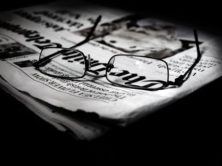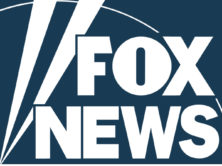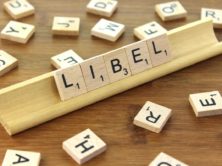
This detail of a screenshot from a CNN interview on YouTube shows the results of Pew's most recent poll on Obama's religion. (Credit: YouTube, CNN)
In recent days, there has been a flurry of news stories commenting on recent polls, showing a substantial percentage of Americans who (gasp!) do not know President Obama’s religion, and a significant increase in the percentage who (double gasp!) believe that Obama is really a Muslim.I know, I know…this is a serious matter.
Who (God forbid!) would want Americans to think that Obama is not one of “us” Christians? This is such a serious issue that the White House expressed “dismay” at the news and has reassured Americans that the president is indeed a Christian; in fact, one who prays every day.
Still, I’m more inclined to go along with the White House spokesman Bill Burton, who said most Americans care more about the economy and wars in Iraq and Afghanistan and “they are not reading a lot of news about what religion the president is.” That view is reinforced by previous polls reported by David Redlawsk, now director of polling at Rutgers University, who wrote in a recent post on AAPORNET:
“We did a poll of Iowa voters in August 2008 at the University of Iowa (The Hawkeye Poll) where we asked about both Obama and McCain’s religion. More answered don’t know for McCain (45 percent) than Obama (38 percent). At that time 8 percent said Obama was Muslim. We did do this open ended, which probably increased the don’t knows overall.
“We replicated the question nationally in October 2008 and got the same effect. For McCain we got 37 percent don’t know and 33 percent for Obama, with 8 percent again saying Obama was Muslim.” [emphasis added]
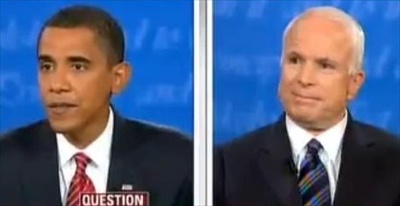 Pres. Barack Obama and Sen. John McCain in a 2008 debate shown in this detail of a screenshot from a TPM TV video posted on YouTube (Credit: TPM TV, YouTube) |
So, maybe the ignorance about Obama’s religion isn’t so surprising, after all. More people didn’t know McCain’s religion than didn’t know about Obama’s. One difference, of course, is that probably nobody believed that McCain was a Muslim, while a small percentage did say they thought Obama was a Muslim.
But what exactly did the most recent polls show? For some reason, the conflicting results of the Pew and Time polls have not been highlighted. Yet the contradictions in their results give us some insight into how seriously we can view either of them.
Conflicting Results of Time and Pew Polls
The Pew poll was conducted over a two-week period, July 21 – Aug. 5, while the Time poll was conducted over a subsequent two-day period, Aug. 16-17. The latter followed comments by Obama that supported the right of a Muslim organization to build an Islamic community center and prayer room two blocks north of Ground Zero in lower Manhattan. But the differences between the two polls can hardly be explained by the difference in timing. Rather, the wording of the questions in the polls itself can exert a profound influence on what the polls measure.
The results are shown in the accompanying graph.
 |
The results that caused the biggest stir are the Pew numbers showing 18 percent of Americans believing Obama is a Muslim, up from 11 percent who expressed that view in March 2009. That 7-point increase (not shown in the graph) is what apparently caused such dismay in the White House. Oddly, Time’s 24-percent figure – a 6-point higher number – has barely been mentioned, except by Time.
Probably the reason the differences between Pew and Time have not been the subject of much discussion is that they are a bit confusing. For example, according to Pew, the percentage of people who believe Obama is a Christian has declined from 48 percent in March 2009 to 34 percent today. The Time poll, on the other hand, shows 47 percent who currently believe Obama is a Christian, virtually the same as Pew in March 2009, but 13 points higher than what Pew shows today.
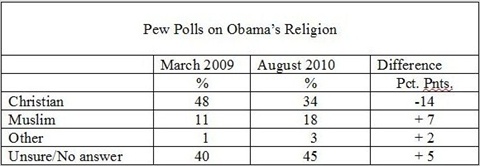 |
The largest difference in the polls is found on the category of “unsure/no answer” – with Pew showing 45 percent of the public in that category, 21 points more than what Time reports.
The main reason for the differences in results is that each polling organization asked the religious affiliation question differently.
Time: “Do you personally believe that Barack Obama is a Muslim or a Christian?”
Pew: “Now, thinking about Barack Obama’s religious beliefs: Do you happen to know what Barack Obama’s religion is? Is he Christian, Jewish, Muslim, Buddhist, Hindu, atheist, agnostic, or something else?”
The Pew question about Obama’s religion is the same wording as a previous question when the respondents were asked about their own religion. Thus, the Pew question did not subtly suggest to the respondent any specific answer. Moreover, Pew’s question is less “forcing” than Time’s question, because the former says “Do you happen to know?” – implying that it’s okay not to know.
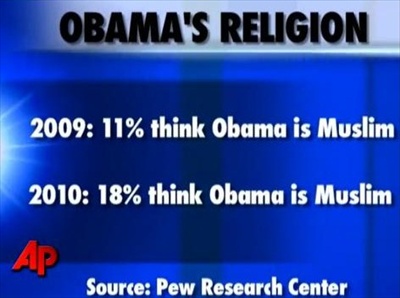 Pew’s polls on Obama’s religion have been well-reported. See above, a detail of a screenshot from an AP news video. (Credit: AP, YouTube) |
The Time question, on the other hand, limits the responses to two categories and essentially “forces” an answer from the respondent. The stronger “forced-choice” aspect of the Time question no doubt accounts for the much smaller percentage of Time respondents (24 percent) who offered no opinion, compared with Pew (45 percent).
When “forced” to make a choice, as Time respondents were, people are more likely to pick “Christian” than “Muslim” – Time got a 13-point higher “Christian” response than Pew, but only a 6-point higher “Muslim” response.
This analysis suggests that the Pew question is probably a more accurate measure of the public’s views about Obama’s religion. But even Pew’s question has some degree of forcing about it. It would have been more accurate to ask if people “happen to know” what Obama’s religion is – “or don’t you know?” That would have reassured the respondents that it was really fine if they didn’t know.
An alternative would be to follow up the question, by asking something along this line: “Do you firmly believe Obama is a (Muslim/Christian), or is that just a guess?”
The point is that in the context of public opinion surveys, respondents will go ahead and guess about questions, in their attempt to cooperate with the interviewer. If we really want to know how many people don’t know something, the question has to provide that as an option – to reduce the implied pressure that respondents must have an acceptable answer.
Much Ado About…Not Very Much?
Brendan Nyhan write on pollster.com, that the Time and Pew polls present “disturbing results,” a theme that can be found in much of the commentary about the polls. As stated in The Washington Post, “The president’s religion, like his place of birth, has been the subject of Internet-spread rumors and falsehoods since before he began his presidential campaign, and the poll indicates that those rumors have gained currency since Obama took office.”
I’m not persuaded. Yes, there has been a lot of misinformation on the Internet about the president’s “real” place of birth and his “real” stance toward the Islamic faith. But the Pew poll shows only a 7-point increase in the number of Americans who – according to the specific Pew wording of the question – believe that Obama is Muslim. I suspect that is more “opinion drift” than real opinion change, caused by a lack of news coverage about Obama’s religion – and by question wording that does not accurately measure public ignorance on the issue.
George F. Bishop is Professor of Political Science and Director of the Graduate Certificate Program in Public Opinion & Survey Research at the University of Cincinnati. His most recent book, The Illusion of Public Opinion: Fact and Artifact in American Public Opinion Polls (Rowman & Littlefield, 2005) was included in Choice Magazine’s list of outstanding academic titles for 2005 (January 2006 issue).
David W. Moore is a Senior Fellow with the Carsey Institute at the University of New Hampshire. He is a former Vice President of the Gallup Organization and was a senior editor with the Gallup Poll for thirteen years. He is author ebooks of The Opinion Makers: An Insider Exposes the Truth Behind the Polls (Beacon, 2008; trade paperback edition, 2009). Publishers’ Weekly refers to it as a “succinct and damning critique…Keen and witty throughout.”






